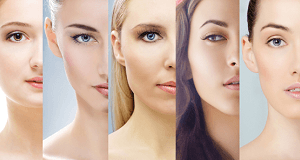
beauty school
22 Oct 2014
The "White Skin" Myth
Perceptions are weird and extremely dangerous, you guys. People with tattoos are viewed as rude and rough-living drug users (nope). People with colored hair are perceived as eccentric and attention-seeking (double nope). People with fair skin are put on a pedestal for being beautiful.
What?
I was a small kid when I first became acutely aware of the “importance” of fair skin, when a distant relative told my mother that little 5-year-old Dhany was “pretty but dark.” Okay. So by this logic, this distant relative of mine has concluded that because I was dark, I could not be pretty. Not only is this garbage, but it was extremely hurtful at the time.
Gauging someone’s value and beauty on the color of their skin is ridiculous. Are you seriously going to look me in the eye and tell me that Alek Wek, Liya Kebede, Anggun, and (heaven forbid) Beyonce are not beautiful because of their skin tone? Get out.
In Indonesia, one of the most common things you’ll hear on TV are advertisements for products that will make skin “whiter.” Not “brighter,” mind you! Remember that there’s a stark difference between products that “brighten” and “whiten”: the former works to eliminate hyperpigmentation and help add glow to dull skin, whereas the latter actually exists to make your skin go as close to #FFFFFF as possible.
Obsession with fair skin is not a new phenomenon: in ancient Rome, fair skin was an indicator of wealth. It was a sign of someone of upper class breeding who did not have to labor under the sun for hours; the desire for fair skin was so important to Roman women that they would slather themselves with lead, despite fully understanding that lead is basically a poison.
The implication that fair skin = high status has obviously carried over across the borders for centuries, because women today are still putting poison on their bodies in the name of lighter skin. It has become an ideal and prized commodity that many people strive to live up to, and one that is entrenched in our social fabric.

You go, girl. (Image source)
Indonesian surfer Diah Rahayu was quoted in this CNN article as having said that “Indonesian girls are scared of getting dark skin and don’t want to go surfing. And I’m the luckiest one, I love the beach.” If this 20-year-old woman spent her time worrying about how her skin would bake under the Bali sun, then she would never rise to become Indonesia’s most prominent female surfer. Can you imagine the damage we are doing to young Indonesian girls by telling them to idealize fair skin? By keeping them indoors, we are also potentially keeping them from being world-class surfers, archeologists, and environmental scientists.
The false paradigm here is that the ideal woman must have fair skin, but this is obviously oppressive and highly misogynistic: a woman’s value, intelligence, and beauty should never be pegged onto the shade of something she was born with. It doesn’t matter if you are born with fair or dark skin, because both are amazing. The skin tone you were born with is yours, and yours alone to enjoy and have fun with.
Come to think of it, Diah’s example of not letting aesthetic ideals govern her passions make a perfect Woman of Worth candidate. L’Oreal Paris is looking for an Indonesian woman who cuts an inspiring figure: someone who aspires to make the world around them a better place through their work. If you know someone who is lights up the people around her through her words or actions, nominate her here, so the rest of the country can come together to celebrate her! To learn more about the Women of Worth campaign,check out this article; and once you’re ready to nominate the ten most inspiring women in your life, you can do so in this link.


